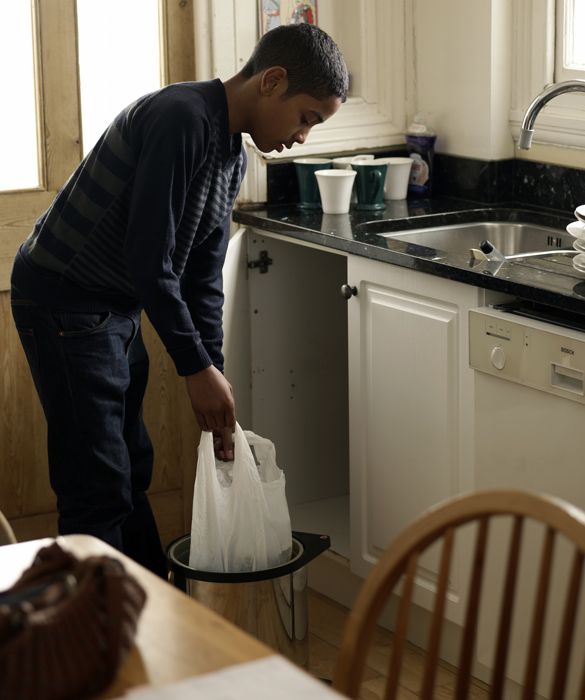Enlist Some Help

Maintaining household duties works best when the entire family contributes. Determining who washes the dishes or takes the trash out can often be a source of conflict, though. Playing on each other’s strengths with duties can help make the tasks less of a chore, says Karla Helbert, Virginia-based psychotherapist and mother of a 5-year-old daughter. Divide and conquer to keep your house in shape and the family satisfied with their contributions.
Negotiate

The days of women conquering the cleaning while men tackle the yard are long gone. Instead of dividing household chores based on gender roles and stereotypes, Helbert recommends dividing tasks based on negotiation and mutual agreement. “Sit down as a family and make a list of household chores and then decide together when each needs to get done and who will be responsible,” she says.
Consider Preferences

Although you may dislike folding laundry, it’s possible that your spouse or children prefer to sort through towels and sheets over mopping the floors or taking out the trash. “Take into consideration who is best at completing which chores, who enjoys certain tasks more or who absolutely hates doing particular things,” says Helbert. If all of you detest vacuuming, work on finding a way to alternate or trade off.
Discuss Commitments

Time is often a concern when both parents are working and children have homework and school activities. Creative scheduling will ensure your home remains clean and free of clutter. “Communicate weekly and discuss your schedules, special events and things that may change your typical ability to get chores done,” says Helbert. You and your spouse may decide to hold off on cleaning the curtains during a busy week but split necessary tasks such as tidying the bathroom or kitchen.
Create Chore Charts

Motivate your children to conquer household duties without moaning and groaning. Chore charts can be helpful in teaching children that they have certain responsibilities and are contributing members of the household, says Helbert. Create a list of tasks and assign points or rewards to some of them to motivate your child. A portion of the chart should include daily tasks, such as making beds and keeping bedrooms neat. You can allow your children to choose tasks or rotate tasks on a weekly basis.
Delegate Errands

From grocery shopping to running younger children to and from sporting events, you may often feel as if you live in your car. Divide the errands each week by getting your teenagers involved. “Teenagers can do nearly any task that an adult can do,” says Helbert. “They should be included in the discussion of division of household chores.” You may be surprised that your teenager is eager to drive his younger sister to piano lessons or pick up the dry cleaning on his way home from school.
RELATED: Deep Cleaning Your Kitchen
Assign Days to Tasks

A consistent schedule helps resolve any conflict or confusion when it comes to completing household duties. Consider assigning specific days for laundry, vacuuming, mopping and running errands. Designate Sunday as laundry day since most of the family will be home to help. This will also ensure everyone has clean clothing for the beginning of the week. If trash pickup is on Friday, assign your children to take out the trash on Thursday.
Sell the Value

Taking out the trash and mopping floors are never appealing, but it’s important to sell the value of the tasks, says Judi Cineas, Florida-based psychotherapist and author of “Attitude Adjustment.” “Help each member understand their role in the family system and how important it is to have each member do their part to keep the system at optimal functionality,” she says. Once your children are assigned a task, allow them to take ownership. If the trash is overflowing, they will soon see how the mess affects the entire family.
RELATED: Making Cleaning Fun for Kids
Set Examples

If your family sees you slacking on household duties, morale and motivation will suffer. “Do your own assignments and do them on time,” says Cineas. If you have a task board, check off when you’re done so that others can see you did your part. Schedule a family work day, too, so everyone can see the effort of family members, suggests Cineas. “Everyone is working together to get the house in order, even if each one is doing something different.”




